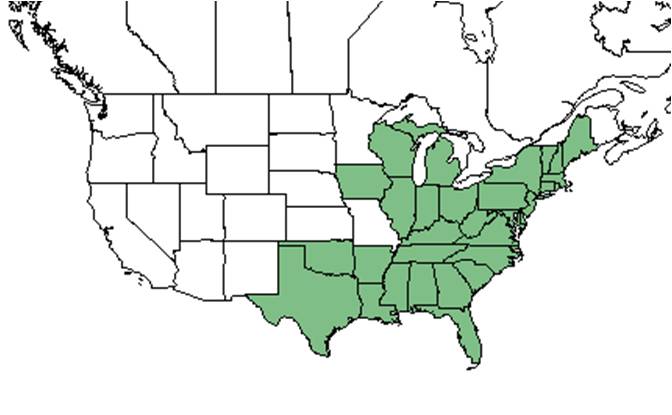Viola primulifolia
| Viola primulifolia | |
|---|---|
Error creating thumbnail: Unable to save thumbnail to destination
| |
| Photo taken by Gil Nelson | |
| Scientific classification | |
| Kingdom: | Plantae |
| Division: | Magnoliophyta – Flowering plants |
| Class: | Magnoliopsida – Dicotyledons |
| Order: | Violales |
| Family: | Violaceae |
| Genus: | Viola |
| Species: | V. primulifolia |
| Binomial name | |
| Viola primulifolia L. (pro sp.) | |

| |
| Natural range of Viola primulifolia from USDA NRCS Plants Database. | |
Contents
Taxonomic notes
Description
"Herbaceous, rhizomatous or stoloniferous perennials, or winter annuals. Leaves crenate or crenate-serrate, dissected, lobed or unlobed; petiolate; stipules conspicuous. Flowers zygomorphic, peduncles directly from the rhizome (acaulescent) or peduncles axillary (caulescent). Chasmogamous flowers with lateral petals often bearded, lower petal spurred; anthers usually seated in the throat, orange appendages conspicuous, lower stamens spurred; spurs fitting in to the spur of the corolla; styles usually clavate, variously shaped at the apex. Dates for Viola, except V. pedata, are for Chasmogamous flowering only, cleistogamous flowering and fruiting commence shortly after chasmogamous flowering and continues until frost. Hybrids are so numerous in this genus that space is not taken to list them." - Radford et al 1964
"Plant acaulescent, rhizomes slender, rarely to 4 mm in diam., stoloniferous. Leaves lance-ovate to widely lanceolate, acute to obtuse, crenate, base truncate to rounded, blade tissue decurrent on the petiole, glabrous or pubescent; petioles 2-18 cm long, glabrous or pubescent; stipules linear to linear-lanceolate, to 2 cm long, acute to acuminate, entire or fimbriate. Peduncles longer than to equaling leaves. Chasmogamous flowers 1-2 cm broad, petals white, beardless, spurred petal veins purple 4-6 mm long, acute, glabrous eciliate, auricles 0.5-1 mm long. Cleistogamous flowers on erect peduncles 2-11 cm long, sepals as in the chasmogamous flowers or auricles to 2 mm long. Capsule 5-8 mm long, glabrous. Seeds brown, 1-1.2 mm long." - Radford et al 1964
Distribution
Ecology
Habitat
In the Coastal Plain in Florida and Georgia, V. primulifolia can be found in hardwood forests, bordering titi-flatwoods, river floodplains, meadows adjacent to rivers, wet flatwoods, pine-palmetto flats, mixed deciduous woods, pine-live oak sandy woodlands, shallow sphagnum bogs, beech magnolia forests, edges of cypress swamps, red bay swamps, burned pinewoods, and boggy areas (FSU Herbarium). It can also be found along powerline corridors, cultivated fields, sandy roads, roadsides and lawns. Soil types include loamy sand, sandy loam, sandy peat, sandy clay, and loam (FSU Herbarium). Associated species include Viola lanceolata, Dryopteris, Illicium, Arisaema, Viola septemloba, Dichondra, Oxalis, Carex, and Juncus (FSU Herbarium).
Phenology
It has been documented to flower January through April and December; and to fruit February through June, November and December (FSU Herbarium).
Seed dispersal
Seed bank and germination
Fire ecology
Pollination
Use by animals
Diseases and parasites
Conservation and Management
Cultivation and restoration
Photo Gallery
References and notes
Florida State University Robert K. Godfrey Herbarium database. URL: http://herbarium.bio.fsu.edu. Last accessed: July 2015. Collectors: Loran C. Anderson, James R. Burkhalter, Robert Kral, O. Lakela, S. C. Hood, Robert K. Godfrey, Lloyd H. Shinners, George R. Cooley, Joseph Monachino, C. Jackson, Robert L. Lazor, Patricia Elliot, Rodie White, R. A. Norris, Walter Kittredge, R. Komarek, J. M. Kane, Lisa Keppner, Ed Keppner. States and Counties: Florida: Bay, Calhoun, Clay, Escambia, Franklin, Gadsden, Gulf, Hillsborough, Jackson, Jefferson, Leon, Liberty, Madison, Okaloosa, Pasco, Wakulla, Washington. Georgia: Grady, Thomas. Compiled by Tall Timbers Research Station and Land Conservancy.
Radford, Albert E., Harry E. Ahles, and C. Ritchie Bell. Manual of the Vascular Flora of the Carolinas. 1964, 1968. The University of North Carolina Press. 729. Print.